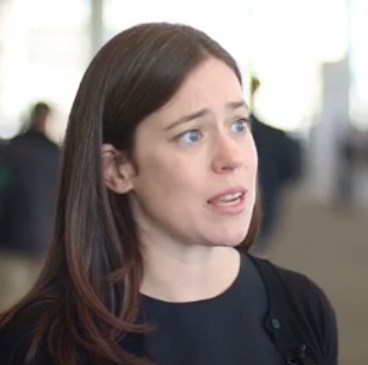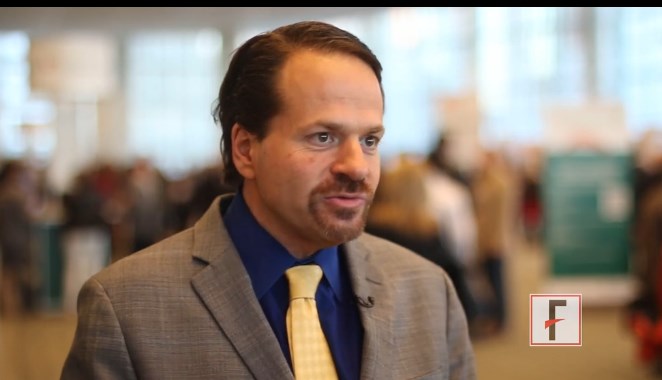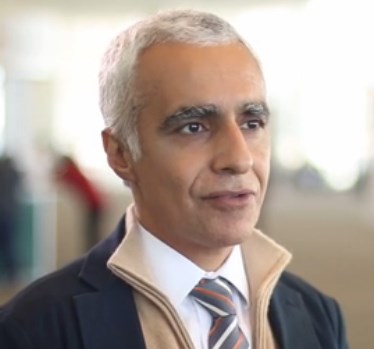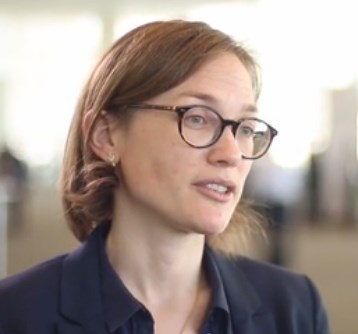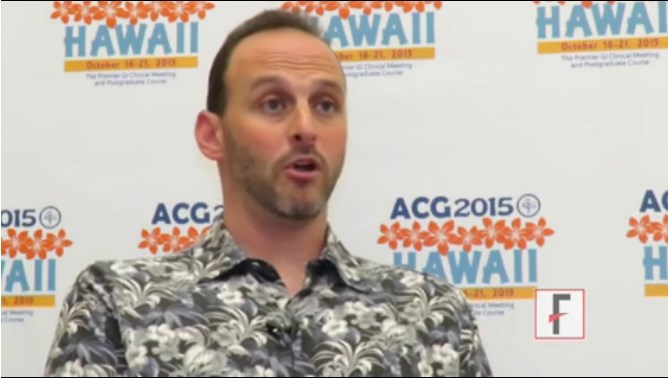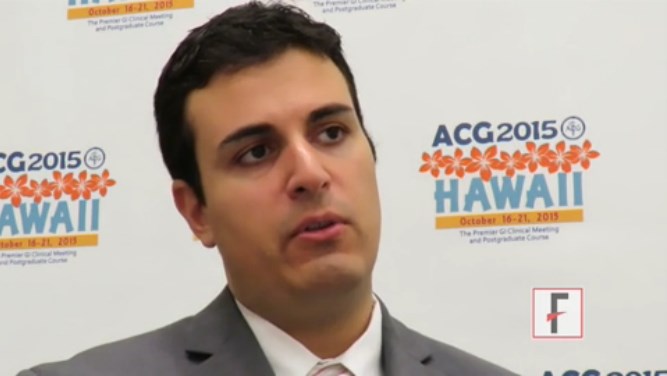User login
Terry Rudd has covered clinical news and health policy as a reporter and editor since 1994.
VIDEO: 12-week HCV retreatment effective if short course fails
SAN FRANCISCO – Can patients who fail short-course treatment for hepatitis C and show high levels of resistance to an antiviral drug still respond to standard 12-week therapy?
“There were initially some data that retreatment might not be as good,” explained Dr. Eleanor Wilson of the University of Maryland, Baltimore.
In the SYNERGY trial, patients underwent short-course therapy with three or four directly acting antivirals. Those who failed the short-course therapies had the opportunity to re-enroll for 12-week standard-of-care therapy. Dr. Wilson and her colleagues studied patients who failed short-course therapy but then underwent 12-week HCV treatment.
In an interview at the annual meeting of the American Association for the Study of Liver Diseases, Dr. Wilson discussed her findings and whether retreatment for 12 weeks was effective, particularly in patients with high levels of resistance to ledipasvir.
The video associated with this article is no longer available on this site. Please view all of our videos on the MDedge YouTube channel
SAN FRANCISCO – Can patients who fail short-course treatment for hepatitis C and show high levels of resistance to an antiviral drug still respond to standard 12-week therapy?
“There were initially some data that retreatment might not be as good,” explained Dr. Eleanor Wilson of the University of Maryland, Baltimore.
In the SYNERGY trial, patients underwent short-course therapy with three or four directly acting antivirals. Those who failed the short-course therapies had the opportunity to re-enroll for 12-week standard-of-care therapy. Dr. Wilson and her colleagues studied patients who failed short-course therapy but then underwent 12-week HCV treatment.
In an interview at the annual meeting of the American Association for the Study of Liver Diseases, Dr. Wilson discussed her findings and whether retreatment for 12 weeks was effective, particularly in patients with high levels of resistance to ledipasvir.
The video associated with this article is no longer available on this site. Please view all of our videos on the MDedge YouTube channel
SAN FRANCISCO – Can patients who fail short-course treatment for hepatitis C and show high levels of resistance to an antiviral drug still respond to standard 12-week therapy?
“There were initially some data that retreatment might not be as good,” explained Dr. Eleanor Wilson of the University of Maryland, Baltimore.
In the SYNERGY trial, patients underwent short-course therapy with three or four directly acting antivirals. Those who failed the short-course therapies had the opportunity to re-enroll for 12-week standard-of-care therapy. Dr. Wilson and her colleagues studied patients who failed short-course therapy but then underwent 12-week HCV treatment.
In an interview at the annual meeting of the American Association for the Study of Liver Diseases, Dr. Wilson discussed her findings and whether retreatment for 12 weeks was effective, particularly in patients with high levels of resistance to ledipasvir.
The video associated with this article is no longer available on this site. Please view all of our videos on the MDedge YouTube channel
AT THE LIVER MEETING 2015
VIDEO: Longer HCV therapy worked even after short-term failures
SAN FRANCISCO – Patients with hepatitis C who fail short-course antiviral treatment may still be able to achieve a cure using longer-duration therapies plus ribavirin, a small study has demonstrated.
The C-SWIFT study, an earlier trial of HCV patients undergoing a 4-week, triple-therapy regimen with sofosbuvir, elbasvir, and grazoprevir, resulted in a cure rate of only about 40% – not the result for which the researchers had hoped.
So, “the idea of this current trial was to take those patients and put them on a regimen that would ultimately give them sustained virologic response or virologic cure,” explained Dr. Eric Lawitz of the Texas Liver Institute, San Antonio. “Within these shortened durations, could we re-treat the patients with the same regimen, extending therapy to 12 weeks and adding ribavirin?”
In an interview at the annual meeting of the American Association for the Study of Liver Diseases, Dr. Lawitz discussed the study’s findings and whether retreatment can deliver a cure in patients who’d earlier failed with shorter treatment regimens.
The video associated with this article is no longer available on this site. Please view all of our videos on the MDedge YouTube channel
SAN FRANCISCO – Patients with hepatitis C who fail short-course antiviral treatment may still be able to achieve a cure using longer-duration therapies plus ribavirin, a small study has demonstrated.
The C-SWIFT study, an earlier trial of HCV patients undergoing a 4-week, triple-therapy regimen with sofosbuvir, elbasvir, and grazoprevir, resulted in a cure rate of only about 40% – not the result for which the researchers had hoped.
So, “the idea of this current trial was to take those patients and put them on a regimen that would ultimately give them sustained virologic response or virologic cure,” explained Dr. Eric Lawitz of the Texas Liver Institute, San Antonio. “Within these shortened durations, could we re-treat the patients with the same regimen, extending therapy to 12 weeks and adding ribavirin?”
In an interview at the annual meeting of the American Association for the Study of Liver Diseases, Dr. Lawitz discussed the study’s findings and whether retreatment can deliver a cure in patients who’d earlier failed with shorter treatment regimens.
The video associated with this article is no longer available on this site. Please view all of our videos on the MDedge YouTube channel
SAN FRANCISCO – Patients with hepatitis C who fail short-course antiviral treatment may still be able to achieve a cure using longer-duration therapies plus ribavirin, a small study has demonstrated.
The C-SWIFT study, an earlier trial of HCV patients undergoing a 4-week, triple-therapy regimen with sofosbuvir, elbasvir, and grazoprevir, resulted in a cure rate of only about 40% – not the result for which the researchers had hoped.
So, “the idea of this current trial was to take those patients and put them on a regimen that would ultimately give them sustained virologic response or virologic cure,” explained Dr. Eric Lawitz of the Texas Liver Institute, San Antonio. “Within these shortened durations, could we re-treat the patients with the same regimen, extending therapy to 12 weeks and adding ribavirin?”
In an interview at the annual meeting of the American Association for the Study of Liver Diseases, Dr. Lawitz discussed the study’s findings and whether retreatment can deliver a cure in patients who’d earlier failed with shorter treatment regimens.
The video associated with this article is no longer available on this site. Please view all of our videos on the MDedge YouTube channel
AT THE LIVER MEETING 2015
VIDEO: Antigen test could simplify HCV screening
SAN FRANCISCO – Hepatitis C testing can be time consuming, expensive, and not widely available, but a new test focused on hepatitis C antigen detection might simplify the process and reduce its costs.
“Our goal was to develop a simple, one-stop test, “said Dr. Ke-Qin Hu of UC Irvine Medical Center, Orange, Calif. “Hepatitis C virus antigens would be good candidates for this.”
In an interview at the annual meeting of the American Association for the Study of Liver Diseases, Dr. Hu discussed the findings from studies of the antigen test, and the test’s potential to improve hepatitis C screening and diagnosis.
The video associated with this article is no longer available on this site. Please view all of our videos on the MDedge YouTube channel
SAN FRANCISCO – Hepatitis C testing can be time consuming, expensive, and not widely available, but a new test focused on hepatitis C antigen detection might simplify the process and reduce its costs.
“Our goal was to develop a simple, one-stop test, “said Dr. Ke-Qin Hu of UC Irvine Medical Center, Orange, Calif. “Hepatitis C virus antigens would be good candidates for this.”
In an interview at the annual meeting of the American Association for the Study of Liver Diseases, Dr. Hu discussed the findings from studies of the antigen test, and the test’s potential to improve hepatitis C screening and diagnosis.
The video associated with this article is no longer available on this site. Please view all of our videos on the MDedge YouTube channel
SAN FRANCISCO – Hepatitis C testing can be time consuming, expensive, and not widely available, but a new test focused on hepatitis C antigen detection might simplify the process and reduce its costs.
“Our goal was to develop a simple, one-stop test, “said Dr. Ke-Qin Hu of UC Irvine Medical Center, Orange, Calif. “Hepatitis C virus antigens would be good candidates for this.”
In an interview at the annual meeting of the American Association for the Study of Liver Diseases, Dr. Hu discussed the findings from studies of the antigen test, and the test’s potential to improve hepatitis C screening and diagnosis.
The video associated with this article is no longer available on this site. Please view all of our videos on the MDedge YouTube channel
AT THE LIVER MEETING 2015
VIDEO: Inappropriate hepatitis A, B tests may be widespread in hospitals
SAN FRANCISCO – A majority of inpatients with suspected acute hepatitis A and acute hepatitis B underwent inappropriate ordering of lab tests for those conditions, a study in one U.S. medical center showed.
“We looked at all the patients that came into our hospital who had acute hepatitis A or acute hepatitis B panels ordered,” explained Dr. Kamran Hussaini of Saint Louis (Mo.) University.
How frequently were those labs ordered inappropriately? “What we found was that the majority of patients who had acute hepatitis A and acute hepatitis B labs had ALT [alanine aminotransferase] and AST [aspartate aminotransferase] levels that were below 100,” Dr. Hussaini said.
In an interview at the annual meeting of the American Association for the Study of Liver Diseases, Dr. Hussaini discussed the study’s findings, what may be driving physicians to order inappropriate and costly hepatitis testing, and which strategies could reduce those trends.
The video associated with this article is no longer available on this site. Please view all of our videos on the MDedge YouTube channel
SAN FRANCISCO – A majority of inpatients with suspected acute hepatitis A and acute hepatitis B underwent inappropriate ordering of lab tests for those conditions, a study in one U.S. medical center showed.
“We looked at all the patients that came into our hospital who had acute hepatitis A or acute hepatitis B panels ordered,” explained Dr. Kamran Hussaini of Saint Louis (Mo.) University.
How frequently were those labs ordered inappropriately? “What we found was that the majority of patients who had acute hepatitis A and acute hepatitis B labs had ALT [alanine aminotransferase] and AST [aspartate aminotransferase] levels that were below 100,” Dr. Hussaini said.
In an interview at the annual meeting of the American Association for the Study of Liver Diseases, Dr. Hussaini discussed the study’s findings, what may be driving physicians to order inappropriate and costly hepatitis testing, and which strategies could reduce those trends.
The video associated with this article is no longer available on this site. Please view all of our videos on the MDedge YouTube channel
SAN FRANCISCO – A majority of inpatients with suspected acute hepatitis A and acute hepatitis B underwent inappropriate ordering of lab tests for those conditions, a study in one U.S. medical center showed.
“We looked at all the patients that came into our hospital who had acute hepatitis A or acute hepatitis B panels ordered,” explained Dr. Kamran Hussaini of Saint Louis (Mo.) University.
How frequently were those labs ordered inappropriately? “What we found was that the majority of patients who had acute hepatitis A and acute hepatitis B labs had ALT [alanine aminotransferase] and AST [aspartate aminotransferase] levels that were below 100,” Dr. Hussaini said.
In an interview at the annual meeting of the American Association for the Study of Liver Diseases, Dr. Hussaini discussed the study’s findings, what may be driving physicians to order inappropriate and costly hepatitis testing, and which strategies could reduce those trends.
The video associated with this article is no longer available on this site. Please view all of our videos on the MDedge YouTube channel
AT THE LIVER MEETING 2015
VIDEO: Survival benefits, relapse risks in liver transplant for alcoholic hepatitis
SAN FRANCISCO – Are policies requiring 6 months of abstinence before liver transplantation in severe alcoholic hepatitis justified, given the potential survival advantage that earlier transplantation offers?
Alcoholic hepatitis has an “exceptionally high mortality rate,” noted Dr. Brian Lee of Johns Hopkins University, Baltimore. But a policy requiring 6 months of abstinence before liver transplantation in patients with severe alcoholic hepatitis “is possibly even causing a precondition that’s death for these patients.”
In an interview at the annual meeting of the American Association for the Study of Liver Diseases, Dr. Lee discussed a study in which early liver transplantation in 40 patients with severe alcoholic hepatitis achieved a 100% survival rate at 1 year, with a 22% alcohol relapse rate.
The video associated with this article is no longer available on this site. Please view all of our videos on the MDedge YouTube channel
SAN FRANCISCO – Are policies requiring 6 months of abstinence before liver transplantation in severe alcoholic hepatitis justified, given the potential survival advantage that earlier transplantation offers?
Alcoholic hepatitis has an “exceptionally high mortality rate,” noted Dr. Brian Lee of Johns Hopkins University, Baltimore. But a policy requiring 6 months of abstinence before liver transplantation in patients with severe alcoholic hepatitis “is possibly even causing a precondition that’s death for these patients.”
In an interview at the annual meeting of the American Association for the Study of Liver Diseases, Dr. Lee discussed a study in which early liver transplantation in 40 patients with severe alcoholic hepatitis achieved a 100% survival rate at 1 year, with a 22% alcohol relapse rate.
The video associated with this article is no longer available on this site. Please view all of our videos on the MDedge YouTube channel
SAN FRANCISCO – Are policies requiring 6 months of abstinence before liver transplantation in severe alcoholic hepatitis justified, given the potential survival advantage that earlier transplantation offers?
Alcoholic hepatitis has an “exceptionally high mortality rate,” noted Dr. Brian Lee of Johns Hopkins University, Baltimore. But a policy requiring 6 months of abstinence before liver transplantation in patients with severe alcoholic hepatitis “is possibly even causing a precondition that’s death for these patients.”
In an interview at the annual meeting of the American Association for the Study of Liver Diseases, Dr. Lee discussed a study in which early liver transplantation in 40 patients with severe alcoholic hepatitis achieved a 100% survival rate at 1 year, with a 22% alcohol relapse rate.
The video associated with this article is no longer available on this site. Please view all of our videos on the MDedge YouTube channel
AT THE LIVER MEETING 2015
VIDEO: PALBI score sharpened liver cancer prognosis
SAN FRANCISCO – The PALBI liver function score measuring platelet count, albumin, and bilirubin was more effective than Child-Pugh score at predicting survival in hepatocellular carcinoma patients.
“We wanted to get a purely objective score to assess liver function in people with liver disease, and also wanted a score that was more granular and had more refinement to it than [Child-Pugh score] classification,” explained Dr. Sasan Roayaie of North Shore-LIJ Health System, New York.
“By combining those three very objective, readily available lab tests, we were able to come up with a score that we were then able to show in an independent validation cohort of more than 4,000 [hepatocellular carcinoma] patients predicted survival,” he added.
In an interview at the annual meeting of the American Association for the Study of Liver Diseases, Dr. Roayaie discussed PALBI’s development and its potential clinical impact.
The video associated with this article is no longer available on this site. Please view all of our videos on the MDedge YouTube channel
SAN FRANCISCO – The PALBI liver function score measuring platelet count, albumin, and bilirubin was more effective than Child-Pugh score at predicting survival in hepatocellular carcinoma patients.
“We wanted to get a purely objective score to assess liver function in people with liver disease, and also wanted a score that was more granular and had more refinement to it than [Child-Pugh score] classification,” explained Dr. Sasan Roayaie of North Shore-LIJ Health System, New York.
“By combining those three very objective, readily available lab tests, we were able to come up with a score that we were then able to show in an independent validation cohort of more than 4,000 [hepatocellular carcinoma] patients predicted survival,” he added.
In an interview at the annual meeting of the American Association for the Study of Liver Diseases, Dr. Roayaie discussed PALBI’s development and its potential clinical impact.
The video associated with this article is no longer available on this site. Please view all of our videos on the MDedge YouTube channel
SAN FRANCISCO – The PALBI liver function score measuring platelet count, albumin, and bilirubin was more effective than Child-Pugh score at predicting survival in hepatocellular carcinoma patients.
“We wanted to get a purely objective score to assess liver function in people with liver disease, and also wanted a score that was more granular and had more refinement to it than [Child-Pugh score] classification,” explained Dr. Sasan Roayaie of North Shore-LIJ Health System, New York.
“By combining those three very objective, readily available lab tests, we were able to come up with a score that we were then able to show in an independent validation cohort of more than 4,000 [hepatocellular carcinoma] patients predicted survival,” he added.
In an interview at the annual meeting of the American Association for the Study of Liver Diseases, Dr. Roayaie discussed PALBI’s development and its potential clinical impact.
The video associated with this article is no longer available on this site. Please view all of our videos on the MDedge YouTube channel
AT THE LIVER MEETING 2015
VIDEO: Eating before liver stiffness test may skew results
SAN FRANCISCO – Expanding the time between a liver fibrosis patient’s last meal and liver stiffness test may improve the accuracy of the test, according to a Danish study.
In patients referred for high liver stiffness, “we noticed that, when we called them in for a repeat liver stiffness measurement in a fasting state, that suddenly one patient with a high liver stiffness would have normal liver stiffness,” explained study researcher Dr. Maja Thiele of Odense (Denmark) University Hospital. “Potentially, this would have been a patient that we would have biopsied.”
In an interview at the annual meeting of the American Association for the Study of Liver Diseases, Dr. Thiele discussed the study’s findings and the clinical implications of food intake on subsequent liver stiffness test results, and she explained how long liver fibrosis patients should wait after a meal to undergo liver stiffness testing.
The video associated with this article is no longer available on this site. Please view all of our videos on the MDedge YouTube channel
SAN FRANCISCO – Expanding the time between a liver fibrosis patient’s last meal and liver stiffness test may improve the accuracy of the test, according to a Danish study.
In patients referred for high liver stiffness, “we noticed that, when we called them in for a repeat liver stiffness measurement in a fasting state, that suddenly one patient with a high liver stiffness would have normal liver stiffness,” explained study researcher Dr. Maja Thiele of Odense (Denmark) University Hospital. “Potentially, this would have been a patient that we would have biopsied.”
In an interview at the annual meeting of the American Association for the Study of Liver Diseases, Dr. Thiele discussed the study’s findings and the clinical implications of food intake on subsequent liver stiffness test results, and she explained how long liver fibrosis patients should wait after a meal to undergo liver stiffness testing.
The video associated with this article is no longer available on this site. Please view all of our videos on the MDedge YouTube channel
SAN FRANCISCO – Expanding the time between a liver fibrosis patient’s last meal and liver stiffness test may improve the accuracy of the test, according to a Danish study.
In patients referred for high liver stiffness, “we noticed that, when we called them in for a repeat liver stiffness measurement in a fasting state, that suddenly one patient with a high liver stiffness would have normal liver stiffness,” explained study researcher Dr. Maja Thiele of Odense (Denmark) University Hospital. “Potentially, this would have been a patient that we would have biopsied.”
In an interview at the annual meeting of the American Association for the Study of Liver Diseases, Dr. Thiele discussed the study’s findings and the clinical implications of food intake on subsequent liver stiffness test results, and she explained how long liver fibrosis patients should wait after a meal to undergo liver stiffness testing.
The video associated with this article is no longer available on this site. Please view all of our videos on the MDedge YouTube channel
AT THE LIVER MEETING 2015
VIDEO: Expert outlines new thinking on irritable bowel syndrome
HONOLULU – New medications and more patient-focused strategies are changing the treatment of irritable bowel syndrome, as physicians move away from simply treating symptoms and gain a better understanding of IBS processes and mechanisms of action.
“I think there’s kind of an explosion in medications for functional bowel disease, specifically irritable bowel syndrome, over the last couple years, because we’ve gotten a lot smarter about how we think about these patients and how we treat these patients,” explained Dr. Darren M. Brenner, director of the functional bowel program at Northwestern University, Chicago.
In an interview at the annual meeting of the American College of Gastroenterology, Dr. Brenner discussed new approaches to target the syndrome’s mechanisms of action, new thinking by the Food and Drug Administration on IBS drug approval, and the wide range of traditional, complementary and alternative, and diet-related therapeutic options now available to patients.
HONOLULU – New medications and more patient-focused strategies are changing the treatment of irritable bowel syndrome, as physicians move away from simply treating symptoms and gain a better understanding of IBS processes and mechanisms of action.
“I think there’s kind of an explosion in medications for functional bowel disease, specifically irritable bowel syndrome, over the last couple years, because we’ve gotten a lot smarter about how we think about these patients and how we treat these patients,” explained Dr. Darren M. Brenner, director of the functional bowel program at Northwestern University, Chicago.
In an interview at the annual meeting of the American College of Gastroenterology, Dr. Brenner discussed new approaches to target the syndrome’s mechanisms of action, new thinking by the Food and Drug Administration on IBS drug approval, and the wide range of traditional, complementary and alternative, and diet-related therapeutic options now available to patients.
HONOLULU – New medications and more patient-focused strategies are changing the treatment of irritable bowel syndrome, as physicians move away from simply treating symptoms and gain a better understanding of IBS processes and mechanisms of action.
“I think there’s kind of an explosion in medications for functional bowel disease, specifically irritable bowel syndrome, over the last couple years, because we’ve gotten a lot smarter about how we think about these patients and how we treat these patients,” explained Dr. Darren M. Brenner, director of the functional bowel program at Northwestern University, Chicago.
In an interview at the annual meeting of the American College of Gastroenterology, Dr. Brenner discussed new approaches to target the syndrome’s mechanisms of action, new thinking by the Food and Drug Administration on IBS drug approval, and the wide range of traditional, complementary and alternative, and diet-related therapeutic options now available to patients.
AT ACG 2015
VIDEO: Serum amyloid A could be IBD biomarker
HONOLULU – Serum amyloid A levels may offer an effective biomarker to gauge disease activity in inflammatory bowel disease, while baseline fecal calprotectin levels could help predict how patients with IBD will respond to anti-tumor necrosis factor therapy, according to two studies presented at the annual meeting of the American College of Gastroenterology.
“There’s a really high need for biomarkers in order to have a better assessment and better control of disease activity, before treatment and then throughout therapy,” explained the studies’ lead author, Dr. Andres Yarur of the University of Chicago.
In an interview at the meeting, Dr. Yarur discussed the two studies’ results, and how serum amyloid A levels, in combination with C-reactive protein levels, may improve clinicians’ ability to identify active endoscopic disease.
The video associated with this article is no longer available on this site. Please view all of our videos on the MDedge YouTube channel
HONOLULU – Serum amyloid A levels may offer an effective biomarker to gauge disease activity in inflammatory bowel disease, while baseline fecal calprotectin levels could help predict how patients with IBD will respond to anti-tumor necrosis factor therapy, according to two studies presented at the annual meeting of the American College of Gastroenterology.
“There’s a really high need for biomarkers in order to have a better assessment and better control of disease activity, before treatment and then throughout therapy,” explained the studies’ lead author, Dr. Andres Yarur of the University of Chicago.
In an interview at the meeting, Dr. Yarur discussed the two studies’ results, and how serum amyloid A levels, in combination with C-reactive protein levels, may improve clinicians’ ability to identify active endoscopic disease.
The video associated with this article is no longer available on this site. Please view all of our videos on the MDedge YouTube channel
HONOLULU – Serum amyloid A levels may offer an effective biomarker to gauge disease activity in inflammatory bowel disease, while baseline fecal calprotectin levels could help predict how patients with IBD will respond to anti-tumor necrosis factor therapy, according to two studies presented at the annual meeting of the American College of Gastroenterology.
“There’s a really high need for biomarkers in order to have a better assessment and better control of disease activity, before treatment and then throughout therapy,” explained the studies’ lead author, Dr. Andres Yarur of the University of Chicago.
In an interview at the meeting, Dr. Yarur discussed the two studies’ results, and how serum amyloid A levels, in combination with C-reactive protein levels, may improve clinicians’ ability to identify active endoscopic disease.
The video associated with this article is no longer available on this site. Please view all of our videos on the MDedge YouTube channel
AT ACG 2015
Gut Microbiota May Predict C diff Treatment Response
HONOLULU – Could gut microbiota be a better predictor than clinical factors of a patient’s response to treatment for Clostridium difficile infection?
In a study of 88 patients with C. difficile, the overall treatment failure rate was 12.5% – but clinical factors such as age, sex, ongoing antibiotic exposure, and hospitalization status failed to predict which patients wouldn’t respond to treatment.
So, “we aimed to identify if there are any gut microbiota signatures to predict treatment response and treatment failure,” explained the study’s lead author, Dr. Sahil Khanna of the Mayo Clinic, Rochester, Minn.
In an interview at the annual meeting of the American College of Gastroenterology, Dr. Khanna discussed the study results and why gut microbiota may be an effective predictor of treatment responders and nonresponders.
The video associated with this article is no longer available on this site. Please view all of our videos on the MDedge YouTube channel
HONOLULU – Could gut microbiota be a better predictor than clinical factors of a patient’s response to treatment for Clostridium difficile infection?
In a study of 88 patients with C. difficile, the overall treatment failure rate was 12.5% – but clinical factors such as age, sex, ongoing antibiotic exposure, and hospitalization status failed to predict which patients wouldn’t respond to treatment.
So, “we aimed to identify if there are any gut microbiota signatures to predict treatment response and treatment failure,” explained the study’s lead author, Dr. Sahil Khanna of the Mayo Clinic, Rochester, Minn.
In an interview at the annual meeting of the American College of Gastroenterology, Dr. Khanna discussed the study results and why gut microbiota may be an effective predictor of treatment responders and nonresponders.
The video associated with this article is no longer available on this site. Please view all of our videos on the MDedge YouTube channel
HONOLULU – Could gut microbiota be a better predictor than clinical factors of a patient’s response to treatment for Clostridium difficile infection?
In a study of 88 patients with C. difficile, the overall treatment failure rate was 12.5% – but clinical factors such as age, sex, ongoing antibiotic exposure, and hospitalization status failed to predict which patients wouldn’t respond to treatment.
So, “we aimed to identify if there are any gut microbiota signatures to predict treatment response and treatment failure,” explained the study’s lead author, Dr. Sahil Khanna of the Mayo Clinic, Rochester, Minn.
In an interview at the annual meeting of the American College of Gastroenterology, Dr. Khanna discussed the study results and why gut microbiota may be an effective predictor of treatment responders and nonresponders.
The video associated with this article is no longer available on this site. Please view all of our videos on the MDedge YouTube channel
At ACG 2015
